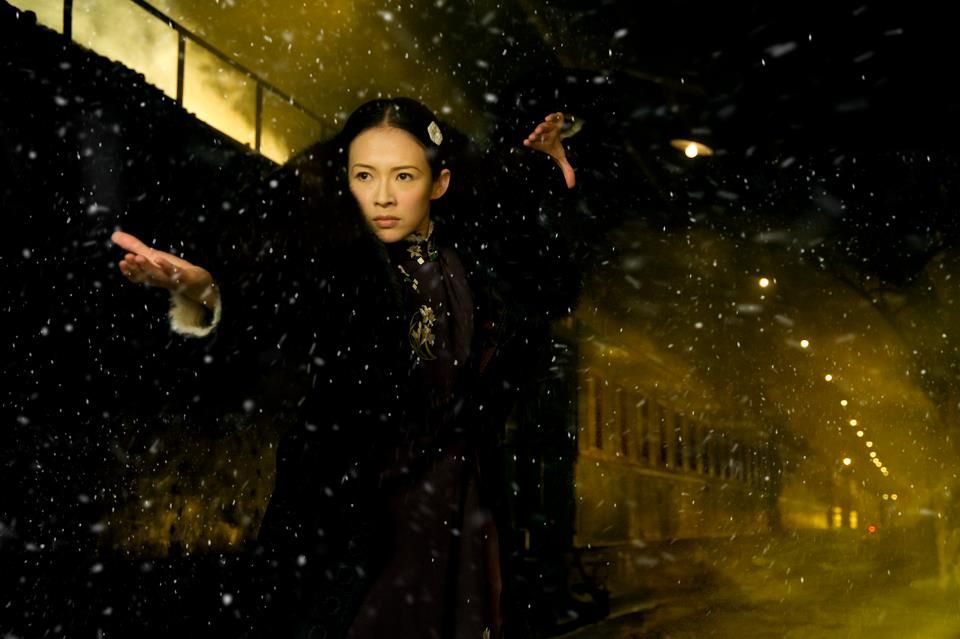Although its trailers tout massive battles and advertise breakneck action set to the strains of music from The RZA, The Grandmaster is much more Crouching Tiger, Hidden Dragon or Hero than The Man With the Iron Fists or Kill Bill.
Director Wong Kar Wai’s second proper “action” film is a poetic but markedly straightforward chronicle of the life of iconic martial arts instructor Ip Man, writ large against the backdrop of Chinese history. Sumptuous and beautifully acted by Tony Leung Chu Wai, Ziyi Zhang and Wang Qingxiang, among others, the The Grandmaster examines the cultural heritage of kung fu in a society that has less and less use for such traditions. But particularly given the Weinstein Company’s alterations to the film to make it more palatable for American audiences, that idea seems more relevant than ever, which is why The Grandmaster is instantly a must-see martial arts film, whether you watch them for the action or for the philosophies beneath.
Leung plays Ip Man, who’s recruited to fight on behalf of Southern Chinese masters to prove the superiority of their various styles. Although he agrees, the bout is delayed by the second Sino-Japanese war, and eventually forgotten about as the concerns of daily survival begin to take priority in the combatants’ lives. But after besting Gong Yutian (Qingxiang) in a battle of philosophies, Ip Man finds himself facing off against Yutian’s daughter Gong Er (Zhang), and a bond slowly develops as the two come to respect one another. However, once Yutian’s disciple – and betrayer – Ma San (Zhang Jin) asserts his superiority over all other fighters and their styles of martial arts, Ip Man and Gong Er and forced to make a choice whether to fight back, even as the traditions they built their lives around continue to become lost by history.
Even in the abridged, and in many ways over-explained, version the Weinsteins created for the film’s U.S. release, there will no doubt be a number of plot developments that audiences may have trouble fully understanding, primarily because a lack of familiarity with either martial arts or basic Chinese history. Nevertheless, its themes are crystal clear, as Ip Man represents one of the martial arts’ last connections to its cultural foundations, which are progressively ignored or devalued as the country gets swept up in more immediately pressing concerns – like the health and safety of friends and family. Over the course of the film, Ip Man finds his own privileged life challenged by the ravages of time and circumstance – forget about kung fu bad guys – and his stalwart embrace of those traditions as the bedrock of Chinese culture, as something to be protected and preserved, offers a powerful lesson in respecting and valuing history.
Even given Woo-Ping’s indefatigable ability to create amazing, inventive fight sequences, the action in the film feels completely singular – if not unprecedented – in its devotion to separate forms of kung fu. As a student of multiple fighting styles, Ip Man prevails over his adversaries by using one after another, combining them, and yet celebrating their individuality. Meanwhile, in portraying each foe as a different kind of expert, the film provides a subtle overview of fighting styles and highlights their importance as a core element of a family or school’s personality or very identity. At the same time, the set pieces certainly function as more than instructional exercises, pushing the story forward and demonstrating how these competitions defined Chinese culture for many decades.
Tony Leung has certainly played his share of tough guys and formidable fighters, but here his performance more resembles his dramatic work, in that even the battles are fought for dramatic purposes – or so they seem to be given his performance. Imbuing Ip Man with a serenity that shouldn’t be mistaken for ambivalence, Leung manages to tap into the well of spirituality that allows the character to attack and defend, but only in equilibrium with his opponent, and always utilizing the values of his training to perform his art devoid of more demonstrable emotion. These, like the fights in Hero or Crouching Tiger, are often won less because of obviously superior skill than via a compromise of honor, and he ennobles his conflicts with the other characters in a way that is not just dramatically compelling but deeply attractive.
As Gong Er, Ziyi Zhang continues to mature as an actress, and delivers one of her best performances to date. It seems easy, even understandable, for an actress to portray the tragic undercurrent of a woman’s life when it is dictated by the repressive demands of history, but as Yutian’s heir – who cannot carry her father’s name because she’s not a man – she instead plays the tragedy of not being able to preserve his traditions. Moreover, she perfectly embodies an idealized woman (far from a trophy or victim) in a culture defined by men, where she possesses even greater strength than her male counterparts, and yet must defer to a sense of patriarchal order. That she is able to deliver an eventual comeuppance to one foe is, narratively speaking, pure cinematic gratification, but Zhang’s performance gives it a gravitas that elevates it above villain-vanquishing wish-fulfillment.
Whether or not the intricacies of its historical backdrop or the philosophical underpinnings of its fighting styles register with audiences, there’s something undeniably attractive about a period defined by honor and respect – the romanticism of a time when what people said and did seemed to mean something. That the film observes this offers a deliberate tribute to previous generations, but make no mistake: Wong’s film isn’t simply a serving of cultural vegetables, so to speak. Rather, it’s a theatrical portrait of important but largely forgotten values, utilized to create great drama. That’s why, ultimately, The Grandmaster is deeply rewarding. Philosophical and visceral, sweeping and intimate, Wong Kar Wai’s film is the rare kind of cinematic experience that informs as it entertains, and most importantly, evokes powerful feelings from both its physical conflicts and intellectual ideas.
The Grandmaster opens today.


